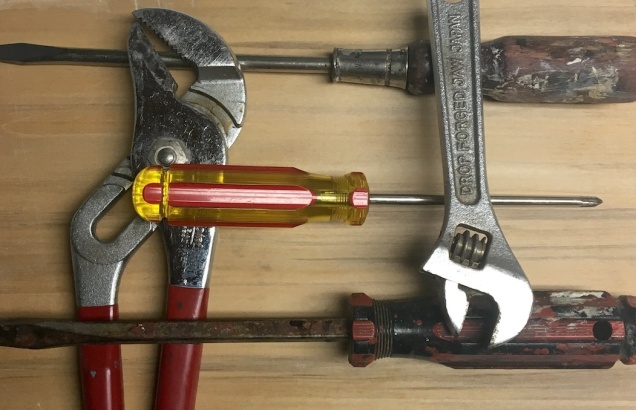A well-stocked workshop is a beautiful thing. Having the right tool, right screw, right dab of paint when you need it makes household repairs end in victory instead of an unplanned trip to the hardware store. But the workshop can also be a catchall full of “that might come in handy someday,” things you bought for one job a decade ago, and other mysterious hardware findings that somehow found their way into your life. If you’re an average human, your workshop has probably built up all kinds of hardware flotsam slowly over time.
Whether you’re staying where you are or in the beginning stages of downsizing, a bit of time editing of your workshop is time well spent. Reducing clutter, reminding yourself of what you actually have and tidying up will make finding whatever you need when you need it easier.
Wondering how and where to start? Sort things by type, rather than by area. Your hand tools might share a drawer with tape and paintbrushes, but it’s much easier to assess what you have when you gather like things. How else will you realize that some way, some how you have managed to have a bakers dozen of phillips head screw drivers?

Identify your key hand tools, sort out your extras
Looking at your hand tools, what are your essentials and what are your duplicates and surplus non-essentials? Group all the surplus together, you’ll be surprised at how many screwdrivers and measuring tapes you have. What to do with those no longer needed hand tools? Make up a tool box for someone in your family who is new to living on their own. Make up small kits to donate to furniture banks for families that have lost everything and are starting over. Donate individual tools to a non-profit Habitat for Humanity ReStore or a similar organization.
Review your power tools
Two things to think about with power tools: do you still use them and are they old enough that they’ve been outmoded by newer models have improved safety. Tools that take up space but haven’t been used for years can be donated, sold or passed on UNLESS they are no longer safe to use. Those should be recycled.
Some power tools represented big investments at the time they were purchased. But if you don’t use it, if you don’t need it or if it’s not safe, it has not earned a spot in your life and it’s time for it to move on.

Sort your nuts and bolts and bit and bobs
A good workbench has a nice assortment of hardware. Hardware is small, doesn’t take up much space and has a magical ability to multiply in stealthy ways over time. Look for screws you bought for one particular project—you needed two, you had to buy a box. And jars of rusty nails. And coffee cans of rusty nails. And the ever popular little bags of hardware that came with furniture, window treatments etc. You will likely find that you have more brass brads than any one person will ever use in a lifetime. Edit down to what you are likely to use and donate or share the rest with others.

Equally able to multiply with stealth are the bits and bobs: outlet covers, adapters, picture hangers, plastic caps, felt furniture pads, lengths of chain, ceiling hooks, mending plates, L-brackets. If you don’t see a use for it in your immediate future, let it go.

Sort your cans and bottles
The workshop is a chemistry lab. There are solvents, lubricants, cleaners, putties, adhesives, paints, stains and everything in between. Start by sorting into three groups: useful, dried out/hardened, no longer needed.
Review the useful things so you know what you have. Put them back on the shelves, grouping like things together. The dried up things can go into the trash. The no-longer-needed things can be divided again into: things you can offer to others, new or nearly full things you can donate, things you can safely dispose of and things that are hazardous waste.
FYI: Old latex paint can be opened, mixed with cat litter and left somewhere with ventilation to harden. Once it’s hard, it can go in your regular trash. Alkaloid paints that clean up with spirits are.
Sort your project supplies
Sometimes a project requires specific supplies. The things that springs to mind immediately are decorative paint treatments, wall papering and laying tile. If you don’t see those projects happening again in your near future, pass on, donate and/or dispose of those things as is appropriate.

Take a look at what’s left
There are lots of things in a workshop that we haven’t talked about like tapes, painting supplies, pipe wraps, rolls of screen mesh, extension cords, twines and ropes, doorknobs, latches and more. Sort through the rest of these things with a trash can on one side and a donate box on the other side.
Step away from the rickety stepladder
Look at your collection of stepladders. Some might be best voted off the island for safety reasons. It might have lived a long full life and is a little rickety from age. Or it might be poorly designed and wasn’t particularly safe to use from the start. (Those are the ones without anything to hold on to when you are going up 2 or 3 steps.) And anything held together with duct tape should probably also be asked to leave.
It’s not a bad time to look at a step stools as well. If it has a non-slip top, wide balanced base and no duct tape reinforcements, it’s probably fine. If not, time to go!
And finally…
Now that you’ve sorted and organized, you may find yourself with storage boxes, drawers and bins that you don’t need anymore. Donate or pass them on, don’t leave them to fill up again! And give yourself a pat on the back at a job well done. Somewhere, someone is setting up their first workshop, and the things you no longer need will go on to have a new, useful life with them.










